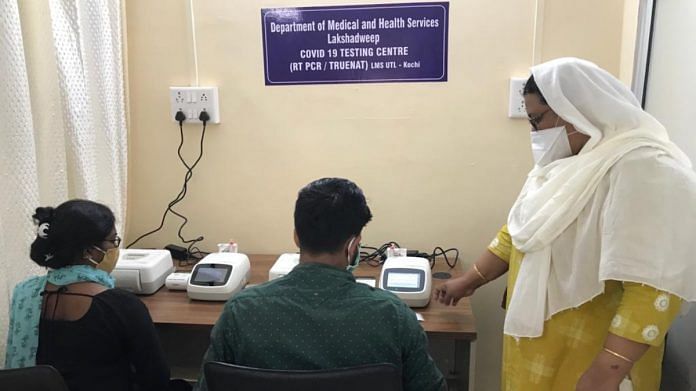New Delhi: India is just one step away from reaching one million Covid-19 cases — the total cases in the country currently stands at 9,36,181. But one union territory has remained coronavirus-free so far — Lakshadweep.
It is the only region in India that does not feature in the health ministry’s list of Covid-19 cases, and such is the confidence of the Lakshadweep administration that it has recently sent a request to the central government to allow schools to reopen even as most other states are still balking at the idea.
The union territory with a population of just 64,473 has managed to keep the SARS-CoV-2 virus at bay through a number of measures — strict access control, long quarantine periods and comprehensive symptomatic testing within its perimeter.
The UT administration has so far tested just 61 people — all according to the protocol set by the Indian Council of Medical Research (ICMR) for testing people with symptoms of influenza-like illnesses or severe acute respiratory infections (SARI).
All of them came negative, says Dr S. Sundaravadivelu, Health Secretary, Lakshadweep. Thanks to the early and elaborate checking routine instituted in Kochi, Kerala — the “mainland” on which this tiny group of 36 islands (of which only 10 are inhabited) depend for everything, from essential supplies to healthcare.
Flights and ships to the archipelago also operate from Kochi, which is why it was the focus of the Lakshadweep administration very early on.
Also read: When Rajiv Gandhi had a whale of a time in Lakshadweep… and performed a ‘heroic’ act
Early start
Dr Sundaravadivelu says that what worked for them is an early start and an acute realisation that if Covid-19 invades the union territory, then its inadequate medical infrastructure would collapse completely.
The best bet was to stop people from coming into the region through a several tiered access-control mechanism.
“We started screening passengers right at the beginning of the pandemic. In the rest of the country, screening for domestic passengers started much later — even now only a few states are doing pre-boarding screening. But we started pre-boarding screening at the Kochi airport (much before),” he says.
Pre-boarding screening of ship passengers started in Kochi from 1 February and of air passengers from 9 February. Screening of air passengers on arrival at Agatti — the lone airport in the UT — began on 1 February, he says.
“Anybody wanting to come here had to undergo seven days (of) institutional quarantine under our watch at our guest house. Now we have also taken two hotels (in Kochi). After that period, the person has to undergo tests. We started early because we knew our health infrastructure is very poor and it would be easily overwhelmed once the disease entered,” he adds.
Even after arrival at Agatti airport, there is a mandatory 14-day home-quarantine requirement for additional safety.
For international passengers, even after the mandatory institutional quarantine of the Kerala government is over, they have to further go into a 14-day home-quarantine enforced by the Lakshadweep administration.
Dr Sundaravadivelu is right when he says that the health infrastructure in Lakshadweep is poor. There are just three hospitals in the UT — Indira Gandhi (IG) Hospital and Rajiv Gandhi Speciality Hospital in Kavaratti, and the Government Hospital in Minicoy.
There are 70 beds at the IG hospital and Government Hospital in total — a new block with 30 beds was reserved for Covid patients at the IG Hospital after the outbreak. It has not made its debut yet.
The Rajiv Gandhi Speciality is a 100-bed tertiary care hospital owned by the Government of India and managed by a private group.
There are three 30-bed community health centres in the three islands of Androth, Amini and Agatti. There are four primary health centres — each with 10 beds — in Kadmath, Kalpeni, Kilthan and Chetlat. There are no medical colleges or private hospitals in the UT.
“We go to Kochi for all our healthcare needs, other necessities, even to write examinations. That is why the Kochi pre-boarding screening both for flights and ships has been very crucial. We have also been very strict with the quarantine requirements,” Dr Sundaravadivelu says.
Also read: 7 islands in Lakshadweep and Andamans identified for seaplane operations
Entry restrictions also helped
The administration has so far been paying the charges for even those who are quarantined in the two hotels in Kochi. “We want them to be under our watch before they come,” he says.
Since the pre-boarding checks began in Kochi, only two people have tested positive — the second one last Friday.
Earlier, the RT-PCR test was being done, but now TrueNAT, which is cheaper, is being used for testing.
What also helped the administration is the fact that the entry to Lakshadweep islands is restricted. One requires an entry permit issued by Lakshadweep administration to visit these islands.
The UT has now asked for schools to be allowed to reopen. “We are awaiting directions of the MHA (home ministry) on that,” says Dr Sundaravadivelu, who is also the home secretary.
About Lakshadweep
The union territory was formed in 1956 and it was named Lakshadweep in 1973. It is India’s smallest union territory — the name ‘Lakshadweep’ in Malayalam and Sanskrit means ‘a hundred thousand islands’.
The total area of the 36 islands is 32 sq km and there is just one district in the whole of the UT. All the islands are 220 to 440 km away from the coastal city of Kochi.
Apart from the flights from Kochi, seven passenger ships — MV Kavaratti, MV Arabian Sea, MV Lakshadweep Sea, MV Lagoon, MV Corals, MV Amindivi and MV Minicoy — operate between Kochi and Lakshadweep islands.
Also read: Lakshadweep to stop foreign tourists from entering islands due to coronavirus outbreak



